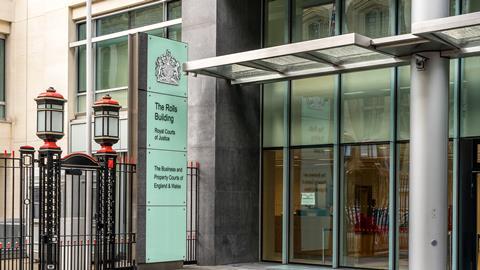A prominent member of the Saudi royal family has beaten off a High Court bankruptcy order because the petitioner could not show he was resident in the UK.
Chief Insolvency and Companies Court Judge Briggs, sitting as a judge of the High Court, found the evidence did not show Prince Hussam Bin Saud Bin Abdulaziz Al Saud was liable to English bankruptcy law.
Hussam, a son of the late King Saud, is a businessman and governor of Saudi Arabia's Al-Bahah province. In 2022 he was subject to a $1.2bn bankruptcy petition filed in relation to an arbitration award. Petitioner Mobile Telecommunications Company, a Kuwati telecoms company, had been in dispute with the prince since 2010 and it was awarded more than £700m by an arbitral tribunal in 2012. Default commission has accrued at a rate of more than £90,000 a day since September 2017.
Hussam has disputed the validity of the award in subsequent proceedings. According to the judgment in Mobile Telecommunications Company KSCP v HRH Prince Hussam Bin Saud Bin Abdulaziz Al Saud he made a ‘tactical decision’ to issue proceedings in Saudi Arabia. The petitioner then obtained an anti-suit injunction in the High Court requiring him to discontinue. He failed to do this and in 2018, Mr Justice Jacobs found the prince in contempt of court and sentenced him to 12 months’ imprisonment in his absence.
A statutory demand was served on the prince in 2020 and the court dismissed his application to set this aside in 2022. Different judges concluded that Prince Hussam had a place of residence in England and Wales for the purposes of insolvency proceedings. Briggs’ judgment following a five-day hearing last month reversed that position.
The court heard that Prince Hussam had lived with his wife at a Kensington flat between 1987 and 1990 but then moved back to live in Saudia Arabia, with infrequent visits since then. It was accepted by the petitioner that the prince has no legal or beneficial interest in this flat or any other London property, but MTC did point to his being registered for council tax at the Kensington address until December 2019.
Prince Hussam denied during cross-examination that he had a residence in England and his evidence was assessed by the judge as ‘honestly given and reliable’.
The judge said the prince knew nothing of his registration for council tax, which was arranged by someone else, and the evidence supported an intention to have no place of residence in England after 1990.
The judge added: ‘This is supported by the evidence in chief given by Prince Hussam, the evidence given in cross-examination, the location and intensity of his work and family life in Riyadh, the absence of evidence of his life in London, the lack of purpose for a residence in the jurisdiction, and the infrequency of his visits to London in the period 1990 to 2000 measured against the scale of time.’
Hussam had instructed international firm Spencer West for the most recent proceedings. The firm’s lead partner on the case Amrit Johal said: ‘This was a significant and hard-fought achievement. Successfully shielding the client from a $1.2 billion bankruptcy claim, one they consistently contested, is far from an ordinary victory.
‘Prince Hussam showed great resolve and patience throughout, and it is a testament to his true class. This case also signified the importance of the awareness of different cultural values that exist between the West and the Kingdom of Saudi Arabia.
‘The ruling sets a precedent for similar disputes in the future, particularly regarding the jurisdictional challenges that arise in international arbitration and bankruptcy matters.’
This article is now closed for comment.




























1 Reader's comment